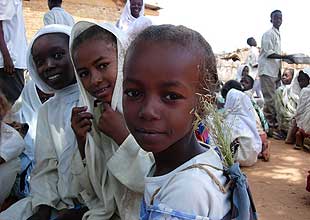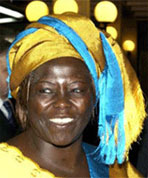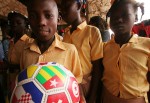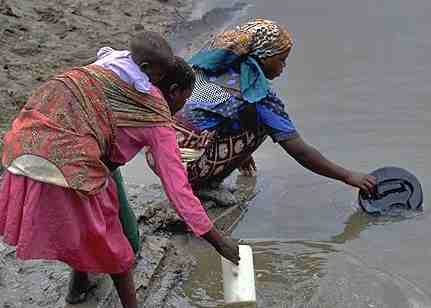 In 1997, the owner of Cable News Network, Ted Turner, shocked the world when he handed over a billion dollars to the United Nations. At the time, the United States had been delinquent in paying its UN dues and Turner was making up for it. He was passionate about the UN’s humanitarianism, especially their women and children’s health programs and environmental work. If you haven’t heard lately about the good deeds of the United Nations, these are five ways the UN is saving people and our planet, every day — including links so you can make donations to their lifesaving efforts…
In 1997, the owner of Cable News Network, Ted Turner, shocked the world when he handed over a billion dollars to the United Nations. At the time, the United States had been delinquent in paying its UN dues and Turner was making up for it. He was passionate about the UN’s humanitarianism, especially their women and children’s health programs and environmental work. If you haven’t heard lately about the good deeds of the United Nations, these are five ways the UN is saving people and our planet, every day — including links so you can make donations to their lifesaving efforts…
1) Feeding 2 Million People in Newly Peaceful Southern Sudan
Feeding school children, supporting skills training, and repairing roads – the United Nations World Food Program (WFP) is participating in the celebration of the second anniversary of peace in South Sudan by marking the achievements of its partnership with the people of the region. WFP plans to feed nearly 2 million people in southern Sudan this year. January 9 marked the anniversary of a peace accord that ended 21 years of war between government and rebel forces. Since the signing, the WFP has fed almost 4 million people including 600,000 people each year who have returned after fleeing the conflict. Recovery and development-oriented projects such as Food for Work, Food for Training and Food for Education, are aimed at reviving the economy and rebuilding livelihoods so residents can sustain themselves. (WFP – South Sudan)
2) Planting a Billion Trees This Year
 In an effort to help mitigate global warming, the United Nations Environmental Program is organizing a campaign to plant a billion trees around the world this year. So far over 157 million tree planting pledges have been received. The Plant for the Planet campaign was inspired by 2004 Nobel Peace Prize winner and green activist Wangari Maathai. Ms. Maathai founded the Green Belt Movement in Kenya in 1977 and since then it has inspired nearly 900,000 rural women to establish tree nurseries and plant more than 30 million trees to reverse the effects of deforestation throughout Africa. Anyone can participate in the UN’s Billion Tree Campaign — children, community groups, schools, businesses and governments — taking action to address perhaps the key challenge of the 21st century, climate change. Join the effort and get advice on tree planting via the Web site.
In an effort to help mitigate global warming, the United Nations Environmental Program is organizing a campaign to plant a billion trees around the world this year. So far over 157 million tree planting pledges have been received. The Plant for the Planet campaign was inspired by 2004 Nobel Peace Prize winner and green activist Wangari Maathai. Ms. Maathai founded the Green Belt Movement in Kenya in 1977 and since then it has inspired nearly 900,000 rural women to establish tree nurseries and plant more than 30 million trees to reverse the effects of deforestation throughout Africa. Anyone can participate in the UN’s Billion Tree Campaign — children, community groups, schools, businesses and governments — taking action to address perhaps the key challenge of the 21st century, climate change. Join the effort and get advice on tree planting via the Web site.
3) Turning Out Gangs in Haiti’s Shantytowns and Bringing In Health Clinics
 The feeling of relief in Haiti’s capital, Port-au-Prince, is palpable after some 700 UN troops completed a sweep into gang territory and re-established peace for residents in the poorest areas of the city. The neighborhoods, notorious for gang violence, are now under the control of Haitian and UN forces. The operations, which began in late December and lasted for two months, was a collaboration with the local population, who used confidential hot-lines to pass on information leading to some of the arrests of nearly 70 suspected gang members and the confiscation of arms and ammunition. Best of all, the Brazilian UN peacekeeping mission has transformed the former crime boss’s headquarters into a free medical clinic, with clowns to cheer up sick children. Now, UN doctors and dentists give free health care, the troops distribute soup and clean drinking water addressing the cause of much of the local disease, and the kids can play safely in the streets with new footballs decorated with the flags of the United Nations.
The feeling of relief in Haiti’s capital, Port-au-Prince, is palpable after some 700 UN troops completed a sweep into gang territory and re-established peace for residents in the poorest areas of the city. The neighborhoods, notorious for gang violence, are now under the control of Haitian and UN forces. The operations, which began in late December and lasted for two months, was a collaboration with the local population, who used confidential hot-lines to pass on information leading to some of the arrests of nearly 70 suspected gang members and the confiscation of arms and ammunition. Best of all, the Brazilian UN peacekeeping mission has transformed the former crime boss’s headquarters into a free medical clinic, with clowns to cheer up sick children. Now, UN doctors and dentists give free health care, the troops distribute soup and clean drinking water addressing the cause of much of the local disease, and the kids can play safely in the streets with new footballs decorated with the flags of the United Nations.
(UN Mission for Stabilization of Haiti) (French)
4) Millions of Bangladeshis Get Water and Sanitation for the First Time
 Thirty million people across impoverished Bangladesh, are set to benefit from a five-year, multi-million-dollar water and sanitation plan, funded jointly by the British and Bangladeshi Governments and the United Nations Children’s Fund. $62.8 million will be invested to support the Government’s Sanitation, Hygiene Education and Water Supply project and help to achieve the Millennium Development Goal of halving the proportion of people without sustainable access to safe drinking water and basic sanitation by 2015. Although Bangladesh has made significant strides in lowering infant and child mortality in recent times, no less than a hundred children still die each day from diarrhoea, caused by poor hygiene and sanitation. Three hundred neighborhoods and 60 sub-districts will receive help in the first two years of the program. (Bangladesh Water Project)
Thirty million people across impoverished Bangladesh, are set to benefit from a five-year, multi-million-dollar water and sanitation plan, funded jointly by the British and Bangladeshi Governments and the United Nations Children’s Fund. $62.8 million will be invested to support the Government’s Sanitation, Hygiene Education and Water Supply project and help to achieve the Millennium Development Goal of halving the proportion of people without sustainable access to safe drinking water and basic sanitation by 2015. Although Bangladesh has made significant strides in lowering infant and child mortality in recent times, no less than a hundred children still die each day from diarrhoea, caused by poor hygiene and sanitation. Three hundred neighborhoods and 60 sub-districts will receive help in the first two years of the program. (Bangladesh Water Project)
5) On Three Continents UN Rushes Aid to Flood Victims
In the last three weeks, the UN stepped up aid to hundreds of thousands of flood victims on three continents, rushing in food and health care to Mozambique, the Philippines, and Bolivia.
 Bolivia is facing one of its most devastating disasters ever as the El Niño weather phenomenon has wrought flooding, landslides, drought, hail and freezing weather. While the number of people in need rises daily, the WFP has already provided food to over 12,000 families. Water supplies have been contaminated and the UN Children’s Fund is leading relief agencies’ efforts to provide water and sanitation supplies, clean contaminated wells and construct temporary latrines. Where crops and livestock have been partially or totally lost, the UN Food and Agriculture Organization is providing aid, including veterinary assistance, to help families recover their livelihoods.
Bolivia is facing one of its most devastating disasters ever as the El Niño weather phenomenon has wrought flooding, landslides, drought, hail and freezing weather. While the number of people in need rises daily, the WFP has already provided food to over 12,000 families. Water supplies have been contaminated and the UN Children’s Fund is leading relief agencies’ efforts to provide water and sanitation supplies, clean contaminated wells and construct temporary latrines. Where crops and livestock have been partially or totally lost, the UN Food and Agriculture Organization is providing aid, including veterinary assistance, to help families recover their livelihoods.
In Mozambique, where flooding has displaced 120,000 people who are now living in overcrowded camps with poor sanitation, the World Health Organization has sent teams to provide medical supplies and chartered a helicopter to deliver food to those stranded by floodwaters.
Halfway around the world, in the Philippines, WFP has provided nearly 300 more tons of rice for some 6,000 Filipino families, many of whom are still living in evacuation camps more than two months after typhoon Reming slammed into the Southeast Asian country displacing nearly 1 million people.
“It takes time to rebuild after a disaster of this scale,” WFP Country Director Valerie Guarnieri said. “The cameras have moved on to crises elsewhere, but WFP will stay with the affected communities while they repair their fishing boats, plant for the next harvest, or find new ways to make a living.” While international aid has been forthcoming, more donor contributions are still needed. (Bolivia Effort, WFP)



















